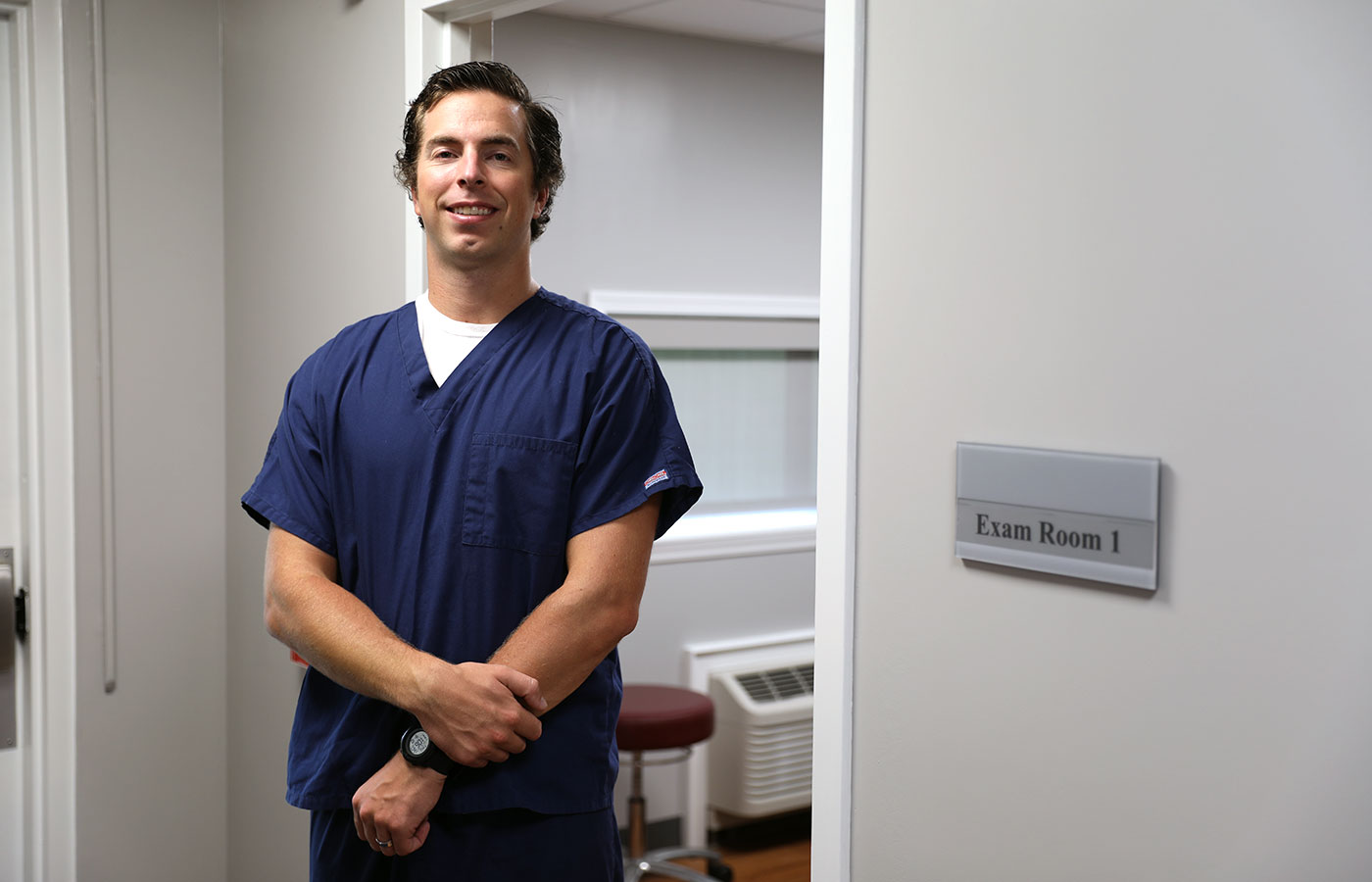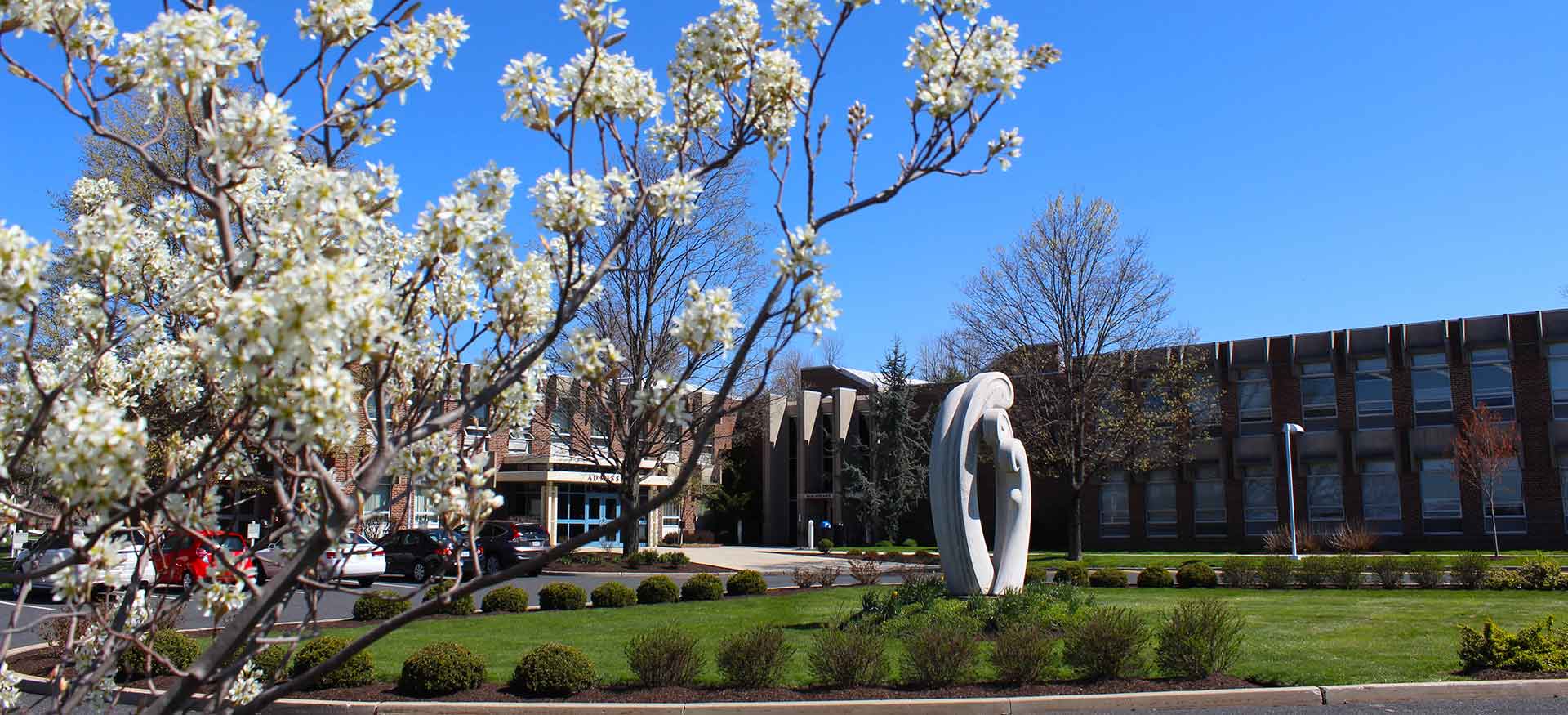Keeping COVID-19 at Bay

Alum Alex Knop ’13, ’17 Returns to Campus as DeSales’ Dedicated COVID-19 Nurse
Step inside DeSales University’s COVID-19 suite in the Dorothy Day Student Union, and you’ll find yourself in a makeshift doctor’s office. There’s a waiting area, an exam room, and an office for Alex Knop, an alum dressed in a white T-shirt and nursing scrubs.
Knop seems to have a penchant for his alma mater. He has not one but two degrees from DeSales. And now, he’s come back to campus yet again—this time, as the University’s dedicated COVID-19 nurse.
“When I was beginning my job search, I was really open to anything that was not what you would consider traditional bedside. I was looking at ambulatory surgery centers and post-surgery recovery. Honestly, school nurse wasn’t really on my radar. But then I ended up seeing a couple different colleges posting for a COVID-19 nurse.”
The Rochester, New York native has always been interested in healthcare, and he was first drawn to DeSales because of its top-rated physician assistant program. Knop ultimately ended up switching gears and graduating with a biology degree in 2013. Not long after, he began carving out a new career path working as a nurse’s aide at Lehigh Valley Hospital.
“I enjoy helping people, and I feel like it’s more interactive and interesting than a desk job,” he says. “When I got down to the emergency department, I saw how variable every day was and how I found it a little more exciting to be closer to the front lines.”
Knop decided to return to the classroom to get his nursing degree, but he wasn’t sold on a school. He looked at accelerated programs in New York, Philadelphia, and the Lehigh Valley. To him, DeSales stood out in three key areas: the length of its accelerated program, the cost, and the clinical environments.
“DeSales has very wide-ranging resources,” he says. “They’re able to set you up easily with the right environment. They’re not sending you to a tiny, remote hospital. The majority of your clinicals are through Lehigh Valley Hospital or St. Luke’s—these big-name hospitals that have very high-acuity patients.”
After graduating from the accelerated nursing program, Knop began working in the emergency room of Lehigh Valley Hospital in October 2017. A year and a half later, he decided to hit the road as a traveling nurse as a way to see the country and immerse himself in new places. He’s lived and worked in cities like Columbia, South Carolina; Portland, Maine; and Houston, Texas.
Knop was based in West Palm Beach, Florida, when COVID-19 cases started making headlines in the United States. The ER he worked in set up a conference room dedicated solely to COVID-19 patients, and he spent the majority of his time swabbing potential cases and setting up telemedicine calls. He was grateful that his hospital, unlike others, had an ample supply of PPE.
“It was a fluid situation,” he says. “You do your best to stay safe every shift.”
Before Florida saw a surge in cases, Knop packed up once again—this time heading west to Denver, Colorado. After a three-month stint in the Rockies, he began looking for a steadier schedule. That’s when his sister, Sarah, a 2019 graduate who recently completed the PA program, sent him the DeSales posting for a COVID-19 nurse.
Wendy Kalamar, assistant dean of students for wellness, knew Knop from his undergraduate days and calls him an incredible asset to the campus’ COVID-19 response team.
“When looking to hire for the position, we knew we needed someone who was knowledgeable but also kind and compassionate,” says Kalamar. “We wanted someone who had experience dealing with COVID-19. Alex also already had experience on our campus and truly understood who we are. I knew he would handle this new position within a Salesian lens.”
Knop’s primary responsibilities are to triage possible cases over the phone, test students using DeSales’ rapid result testing machine, and to report those results to the Pennsylvania Department of Health.
Having come to campus from a hospital setting, Knop knows that being well-prepared is essential to minimizing the number of cases and contacts. He credits everyone—from the faculty and staff to the students—with being invested and doing their part to keep campus safe.
“DeSales was not naive to the fact that we were ultimately going to have positive cases on campus,” he says. “But the difference is that they had a plan in place to deal with those next steps that needed to be taken. DeSales has done everything they can to set up all the facilities, they’ve got testing in place, and they brought me in. We’ve been able to come up with a game plan, and it’s been working out pretty well.”




